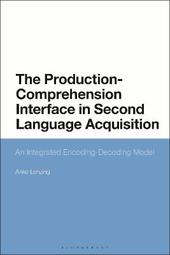
|
The Production-Comprehension Interface in Second Language Acquisition: An Integrated Encoding-Decoding Model
Hardback
Main Details
| Title |
The Production-Comprehension Interface in Second Language Acquisition: An Integrated Encoding-Decoding Model
|
| Authors and Contributors |
By (author) Dr Anke Lenzing
|
| Physical Properties |
| Format:Hardback | | Pages:272 | | Dimensions(mm): Height 234,Width 156 |
|
| Category/Genre | Grammar and syntax |
|---|
| ISBN/Barcode |
9781350148734
|
| Classifications | Dewey:401.93 |
|---|
| Audience | | Professional & Vocational | |
|---|
|
Publishing Details |
| Publisher |
Bloomsbury Publishing PLC
|
| Imprint |
Bloomsbury Academic
|
| Publication Date |
28 January 2021 |
| Publication Country |
United Kingdom
|
Description
Examining a key issue in second language acquisition (SLA) research, this book explores the relation between second language (L2) production and comprehension at the level of processing. The central question underlying this interface is the relationship between grammatical encoding and decoding, namely: are the two modalities of production and comprehension subserved by different types of processors, or by the same syntactic processing module? Proposing an 'Integrated Encoding-Decoding Model' of SLA, Anke Lenzing presents the results of a comprehensive empirical study to demonstrate the extent to which the two modalities rely on shared representations and/or shared processes. Through this detailed analysis The Production-Comprehension Interface in Second Language Acquisition sheds new light on the cognitive architecture of human language processing and offers a deeper understanding of the mechanisms at work in the L2 acquisition process.
Author Biography
Anke Lenzing is Full Professor of English Language Teaching at Innsbruck University, Austria.
ReviewsLenzing's book is unique and compelling. The results of the study offer clear support to her hypotheses and have crucial repercussions not only for the theory and praxis of second-language teaching, but also for experimental and developmental psycholinguistics. This book deserves the serious attention of anyone active in these areas. * Gerard A.M. Kempen, Senior Research Fellow, Max Planck Institute for Psycholinguistics, the Netherlands * Clearly-explained theories form the foundation for innovative research techniques, which are brought together in coherent and consistent ways. Lenzing takes long-established insights and turns them into precise, testable claims that have the potential to be operationalised for other aspects of additional language development. * Howard Nicholas, Associate Professor of Applied Linguistics and Education, La Trobe University, Australia *
|